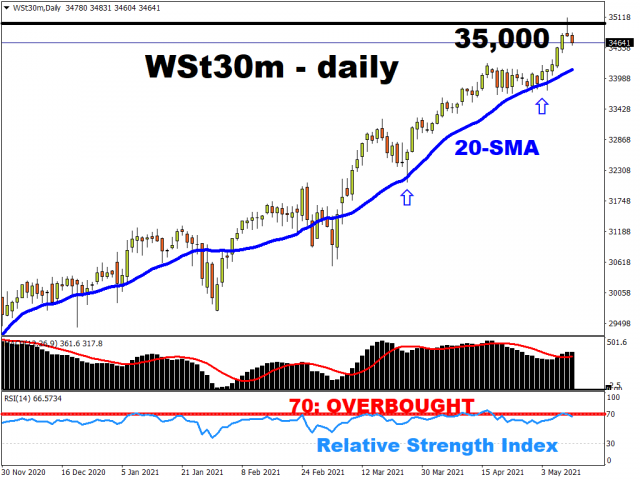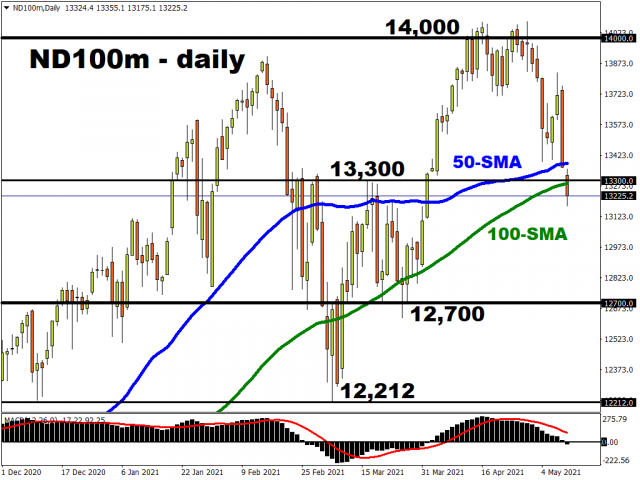By Han Tan Market Analyst, ForexTime
For stock bulls, the good news was that 35,000 Dow did happen on Monday.
However, it only lasted a few hours, before the index ended 0.1% lower. From a technical perspective, it was ripe for a pullback, given that its 14-day relative strength index had breached the 70 mark which signals overbought levels.
Monday’s drop was far more noticeable in US tech stocks, with benchmark indexes dragged lower by tech megacaps:
Free Reports:
 Download Our Metatrader 4 Indicators – Put Our Free MetaTrader 4 Custom Indicators on your charts when you join our Weekly Newsletter
Download Our Metatrader 4 Indicators – Put Our Free MetaTrader 4 Custom Indicators on your charts when you join our Weekly Newsletter
 Get our Weekly Commitment of Traders Reports - See where the biggest traders (Hedge Funds and Commercial Hedgers) are positioned in the futures markets on a weekly basis.
Get our Weekly Commitment of Traders Reports - See where the biggest traders (Hedge Funds and Commercial Hedgers) are positioned in the futures markets on a weekly basis.
Note that these six stocks listed above account for nearly a quarter (23.3%) of the S&P 500’s total market cap, while accounting for more than half (56%) of the Nasdaq 100. In other words, the performances of these individual stocks, due to their sheer size, has a major impact on how the broader index performs.
‘Markets Extra’ Podcast: What is an index and why it matters? A chat with Nasdaq.
Given the higher concentration of tech stocks on the Nasdaq 100, it was yesterday’s biggest loser of the three main benchmark US indexes. The Nasdaq 100 fell by 2.63% to post its biggest single-day loss since 18 March 2021.
The futures contract for the Nasdaq 100 has now broken below its 100-day simple moving average (SMA). Tech aficionados would point to the fact that, since the market rout in March 2020, this index’s foray below its 100-day SMA has been fleeting. After that single day loss of 3.13% on 18 March 2021, the Nasdaq 100 went on to advance by almost 10% and post a new record high a month later (16 April).
Some traders are raising their bearish bets on the Nasdaq 100, while pulling funds out of the sector. In short, tech stocks appear likelier to experience larger bouts of volatility compared to other sectors.
Over the immediate term, with momentum now pointing firmly south, there’s likely to be more near-term declines for the Nasdaq 100 before the dust settles.
Why are tech stocks falling hard?
This is likely due to two major concerns:
- Investors now deem the valuations of tech stocks to be overextended and are finding fewer catalysts that can spur these stocks higher.The Nasdaq 100 currently has a PE ratio of 35.63. That’s in contrast to the S&P 500’s PE ratio of 30, and the sub-27 ratio for the Dow. The higher the PE ratio, the more “expensive” the stock is deemed to be.
Hence, with concerns that these valuations are no longer justifiable, in light of the anticipated reopening of the US economy, many investors have instead engaged in the “reflation trade” at the expense of tech stocks which had a remarkable 2020.
- Markets are also growing more concerned about the threat of faster US inflation.This is evident in the breakeven rates for 10-year US Treasuries, which hit a fresh 8-year peak on Monday before moderating slightly since.
Despite the sluggish April US nonfarm payrolls figures released this past Friday, some investors are holding fast to the notion that the trillions of dollars in stimulus spent by the government and the central bank is bound to show up in the inflation data. Such an inflation overshoot might force the Fed to pull back its support for financial markets sooner rather than later. And when policymakers start signalling for sure that they’re ready to pare back their bond purchases, there is likely to be an almighty reaction in US stocks, especially sectors that are showing signs of too much froth like tech.
The jury is still out about the US inflation outlook, and what that might mean for the Fed’s timeline before unwinding its stimulus measures. While such uncertainty may well trigger further bouts of volatility in equities, steadier hands may find more gains to be had from US stocks in the interim.
Disclaimer: The content in this article comprises personal opinions and should not be construed as containing personal and/or other investment advice and/or an offer of and/or solicitation for any transactions in financial instruments and/or a guarantee and/or prediction of future performance. ForexTime (FXTM), its affiliates, agents, directors, officers or employees do not guarantee the accuracy, validity, timeliness or completeness, of any information or data made available and assume no liability as to any loss arising from any investment based on the same.
 Article by ForexTime
Article by ForexTime
ForexTime Ltd (FXTM) is an award winning international online forex broker regulated by CySEC 185/12 www.forextime.com

- COT Metals Charts: Speculator Bets led lower by Gold, Copper & Silver Apr 5, 2025
- COT Bonds Charts: Speculator Bets led by SOFR 1-Month & US Treasury Bonds Apr 5, 2025
- COT Soft Commodities Charts: Speculator Bets led by Soybean Oil, Cotton & Soybeans Apr 5, 2025
- COT Stock Market Charts: Speculator Bets led by S&P500 & Nasdaq Apr 5, 2025
- Today, investors focus on the Non-Farm Payrolls labor market report Apr 4, 2025
- USD/JPY collapses to a 6-month low: safe-haven assets in demand Apr 4, 2025
- GBP/USD Hits 21-Week High: The Pound Outperforms Its Peers Apr 3, 2025
- Most of the tariffs imposed by the Trump administration take effect today Apr 2, 2025
- EUR/USD Declines as Markets Await Signals of a Renewed Trade War Apr 2, 2025
- “Liberation Day”: How markets might react to Trump’s April 2nd tariff announcement? Apr 2, 2025

